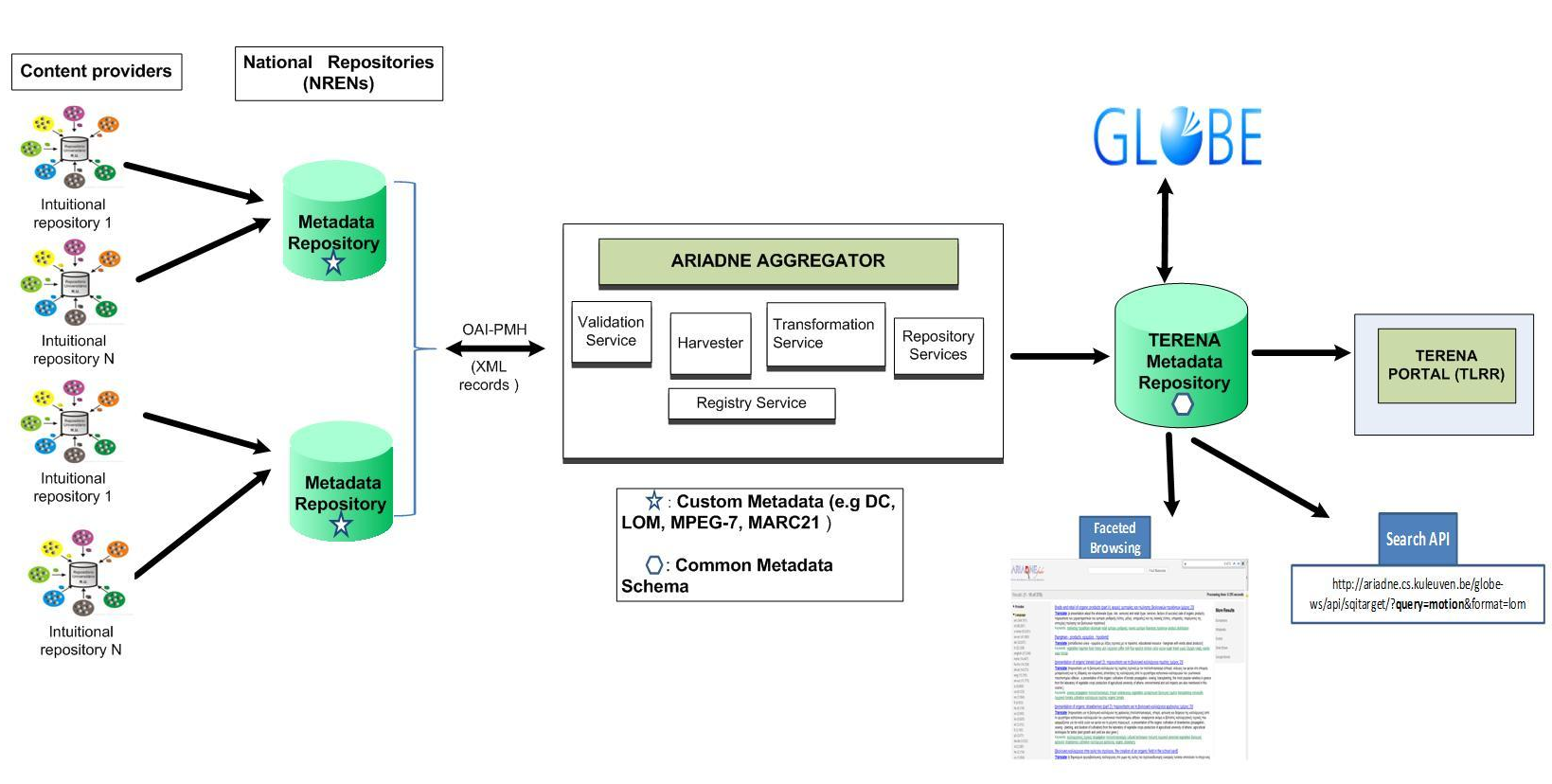...
- Peter (TERENA) will follow up with IUCC, UVigo and GRNET on the test implementations and inform the mailing list about the progress.
DRAFTs
In order to collect the metadata from the repositories participating in the pilot project the ARIADNE infrastructure and services (www.ariadne-eu.org/content/services) could be used.
About
Motivations
There is a large interest around the world in establishing and maintaining learning object repositories as exemplified by the number of existing repositories, organizations building and sustaining them, contributors integrating learning objects in repositories, and users of these learning objects. The fundamental reasons are: the growing educational demands in all countries, the limited capacity of face to face education to fulfil the demand in a timely manner, the effort and cost involved to build multimedia learning materials, and the new possibilities offered by the Internet.
While it is a fact that millions of documents can be found on the Internet using search engines like Google, there is no guarantee that a query will lead to trustable material on which high quality education can be built. Well managed learning object repositories that aggregate high quality content offer a solution to this problem.
Based on http://www.globe-info.org/
Objectives
Connecting the World and Unlocking the Deep Web - Create a one-stop-shop (broker) for national learning resource organizations, each of them managing and/or federating one or more learning object repositories within the country.
TERENA makes a suite of online services and tools available to its members for the exchange of learning resources, and facilitates the access to the worldwide Open Community (i.e. GLOBE) guided by the following principles:
- Keep the barrier of entry to TLRR low and participation high.
- Provide open specifications and community source code as much as possible, openly shared among and beyond community members.
- Use open standards, where appropriate, and contribute back to the development of these standards based on experiences and best practices.
- Respect and build on European values.
- Operate as a community of peers.
Based on http://www.globe-info.org/
Benefits
The expected benefits for the users are as follows:
- More effective and motivating learning scenarios (learners & trainees).
- Better productivity and new philosophy of collaboration (authors of pedagogical material).
- Better communication and co-working schemes (researchers).
- Possible factor for harmonizing education & training policies throughout Europe.
- Spare public money by re-using open learning resources.
The Pilot Project
1) TERENA implements an open source metadata broker/portal (TLRR) that leaves the metadata in its source domain but grant access to the metadata from the higher level.
2) TF-Media defines the minimum requirements for a common metadata schema.
3) Start collecting lectures’ metadata from the NRENs participating in the pilot and make them available via the TERENA portal.
4) TLRR applies for the GLOBE membership.
Milestones, timing, etc.
List of Potential Participants
- SWITCH (SWITCHcast)
- FCCN (Banco do Video)
- ISEP (MELOR)
- RedIRIS (ARCA)
- University of Vigo (…)
- IUCC (MELOR)
- NIIF (Videotorium)
Q&A
Q: What can be the role of an NREN?
A: To bring the learning resources information (not the object itself) at the higher (i.e. national) level.
Q: Why should the national repository join TLRR (i.e. what is the additional value of TEREAN)?
A: To step from the national level to the Pan-European and later global (i.e. via GLOBE) level of aggregation.
Q: How can I convince lecturers to share their content?
A: Tell them not to share the whole lecture but just some chunks of it as a Learning Object. In return, they will be able to re-use LOs from other lecturers to enrich their presentation.
Q: What is the actual Business Case for NRENs?
A: Universities use public money to create lecture content. Sharing, enriching and re-using the content made available by lecturers eventually spares time, efforts, and public money.
Q: What is the benefit of TLRR over Goole Search?
A: Using TLRR one can do deep search and find content that is most likely hided from Google Search or other web search engines.
t
